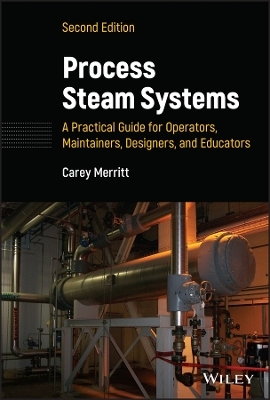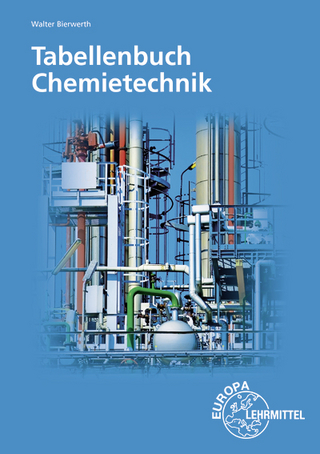
Process Steam Systems: A Practical Guide for Operators, Maintainers, Designers, and Educators
John Wiley & Sons Inc (Verlag)
978-1-119-83893-7 (ISBN)
- Lieferbar
- Versandkostenfrei
- Auch auf Rechnung
- Artikel merken
The revised second edition of Process Steam Systems: A Practical Guide for Operators, Maintainers, Designers, and Educators delivers a practical guide to ensuring steam systems are properly and efficiently designed, operated, and maintained. The book provides comprehensive information designed to improve process steam system knowledge, reliability, and integration into current manufacturing processes.
The most up-to-date version of this volume includes brand-new coverage of current codes, sustainability measures, and updated applications. Heat transfer theory and thermodynamics are tied into practical applications with new practice problems ideal for both professionals seeking to improve their skills and engineers-in training.
Readers will also find:
Thorough design criteria for process steam systems, complete with detailed illustrations for piping and controls
An entirely new chapter on the history of steam systems, including the evolution of the ASME code and boiler accidents
Revised coverage of current NFPA, ASME, CSD-1, FM, and building codes, as well as new insurance requirements relevant to practitioners in the industry
Expansive design guidance for steam system efficiency upgrades
Perfect for operations and maintenance staff at manufacturing, healthcare, and commercial laundries, Process Steam Systems: A Practical Guide for Operators, Maintainers, Designers, and Educators will also earn a place in the libraries of consulting engineers and engineering students with an interest in process manufacturing.
Carey Merritt has over 30 years’ experience designing, operating, and maintaining process steam systems. He has designed over 200 process steam systems in a wide variety of industries and countries, including Australia, Canada, and China.
Preface xi
Acknowledgments xiii
List of Examples xv
List of Tables xvii
1 Steam: a Heat Transfer Fluid 1
Why Steam? 1
Steam Is Safe and Flexible 2
Steam Is Easy to Control 2
The Concept of Steam Formation: Boiling 3
Pressure and Boiling 4
The Ideal Gas Law 6
2 The Development of Boiler Safety 9
How It All Began 9
The Consequences of Development 10
Development of Asme Code 12
Future of Steam 13
3 Understanding Heat Transfer 15
Radiation-Type Heat Transfer 15
Conduction-Type Heat Transfer 18
Convection-Type Heat Transfer 21
The Heat Transfer Equations 23
The Overall Heat Transfer Coefficient (U) 23
mean Temperature Difference (ΔT M) 25
ΔT m for a Steam Boiler 26
ΔT m for a Steam to Process Fluid Heat Exchanger 27
Surface Area (m) 27
Heat Flux 30
4 Steam Formation, Accumulation, and Condensation 31
The Boiling Process 31
Steaming 32
Latent and Sensible Heat Versus Pressure 34
Condensation of Steam 34
The Formation of Flash Steam 36
Steam Accumulation and Storage 38
5 Steam Quality: It Matters 41
Why Steam Quality Is Important 42
Poor Steam Quality Causes and Cures 42
Steam Classifications 45
Measuring Steam Quality 47
Superheated Steam 48
6 The Steam System Design 53
Steam System Types 53
The Process Steam System: An Overview 55
7 The Steam Generator 59
The Ideal Steam Generator 60
Steam Generator Types 62
Fossil Fuel-Fired Boilers 62
Solid Fuel-Fired Boilers 68
Electric Boilers 70
Unfired Steam Generators 73
Heat Recovery Steam Generators 74
8 Boiler Operation and Trim 75
The Packaged Boiler Concept 76
Fuel Delivery and Combustion Systems 83
Low Emissions 91
Multiple Boiler Sequencing 94
9 The Steam Delivery System 97
Steam Flow 97
Steam Distribution Piping 98
Control Valves 111
Steam Accumulation 116
Steam Filtration 120
Sensors and Meters 122
Steam Metering 123
Stop and Safety Valves 123
10 The Condensate Recovery System 129
Condensate Line Sizing 131
Steam Trap Applications 134
Thermostatic Group 134
Mechanical Group 134
Thermodynamic Group 134
Thermostatic Steam Trap Group 134
Mechanical Group 136
Thermodynamic Group 139
Flash Steam Utilization 142
How to Size Flash Tanks and Vent Lines 143
Condensate Collection 146
Electric Condensate Return System 146
Pressure Motive Condensate Pump 148
Pressure Motive Pump Installation Requirements 148
Pumped Condensate Return Line Installation 151
Surge Tank Application 152
11 The Feed Water System 153
Feed Water Deaeration 153
The Elimination of Dissolved Gases 154
Feed Water Tanks 156
Feed Water Tank Sizing 158
Feed Water Pumps 160
Feed Water Pump Sizing 164
Feed Water Piping 166
Feed Water-Surge Tank Controls 168
12 Steam System Chemistry Control 169
Basic Water Chemistry 169
Scale Control 171
Fouling Control 174
Corrosion Control 175
Boiler Blowdown 178
Best Operating Practices for Boiler Blowdown 179
Automatic Versus Manual Blowdown Controls 179
Determining Blowdown Rate 180
Chemical Feed Systems 181
Chemistry Limits 183
Steam System Metallurgy 183
13 Mechanical Room Considerations 187
Codes and Standards 187
Steam Load Profile 190
Steam System Performance Considerations 192
Environmental Considerations 194
Boiler Room Utilities 200
14 Steam System Applications 207
Low-Pressure Steam with High Condensate Returns 209
High-Pressure Steam with High Condensate Returns 210
High- or Low-Pressure Steam with Little or No Returns 212
High-Pressure or Superheated Steam with Condensate Returns 214
Multiple Boiler Installations 215
Steam for Hot Water Generation 217
Other Miscellaneous Steam-Use Application Designs 219
15 Specialized Steam Equipment 223
Back Pressure Turbine 223
Steam Hydro Heater 225
Steam Superheaters 226
Steam Dump Mufflers 229
Jacketed Kettles 230
Sterilizers 230
Reboilers 231
16 Steam System Efficiency/Sustainability 233
The System Heat Balance 233
Boiler Heat Balance 234
Boiler Efficiency 234
Steam System Efficiency 239
Boiler Internal Cleanliness 244
Steam Delivery System Efficiency 245
Condensate and Feed Water System Efficiency 246
Biomass Fuel Water Content Reduction 248
17 Shutdown, Startup, Inspection, and Maintenance 249
Shutdown and Startup Practices 249
Boiler Safety Checks 251
Maintenance and Inspection Practices 253
Inspections 255
Boil Out and Layup Practices 257
18 Troubleshooting and Commissioning Basics 261
Startup Versus Commissioning 261
Approach to Troubleshooting 262
Don’t Play the Blame Game 262
Precommissioning 263
19 Commissioning and Troubleshooting the Steam Generator 265
Determining Boiler Input, Output, and Efficiency 265
Boiler Performance Test 267
Commissioning the Boiler Burner Controls 269
Commissioning the Boiler Pressure Control System 269
Commissioning the Boiler Level Control System 270
Commissioning the Boiler Blowdown Controls 270
Steam Boiler Troubleshooting 270
20 Commissioning and Troubleshooting the Steam Delivery System 279
Steam Distribution Piping 279
Control Valves 280
Steam Piping Venting 281
Condensate Trapping/Draining 281
Troubleshooting the Steam Delivery System 281
21 Commissioning and Troubleshooting the Condensate and Feed Water System 283
Condensate Collection 283
Feed Water System 285
Troubleshooting the Condensate and Feed Water Systems 285
22 Commissioning and Troubleshooting the Water Treatment Equipment 289
Setting Up the Water Treatment Systems 289
Troubleshooting Water Treatment System Problems 290
23 Sample Problem Sets 293
Appendix A References and Reference Information 297
Appendix B Operations, Maintenance, and Inspection Guidance 313
Appendix C Steam System Design and Commissioning Guidance 323
Appendix D Problem Set Answers 331
Index341
| Erscheinungsdatum | 28.10.2022 |
|---|---|
| Verlagsort | New York |
| Sprache | englisch |
| Gewicht | 1560 g |
| Themenwelt | Naturwissenschaften ► Chemie ► Technische Chemie |
| Technik | |
| ISBN-10 | 1-119-83893-2 / 1119838932 |
| ISBN-13 | 978-1-119-83893-7 / 9781119838937 |
| Zustand | Neuware |
| Haben Sie eine Frage zum Produkt? |
aus dem Bereich


